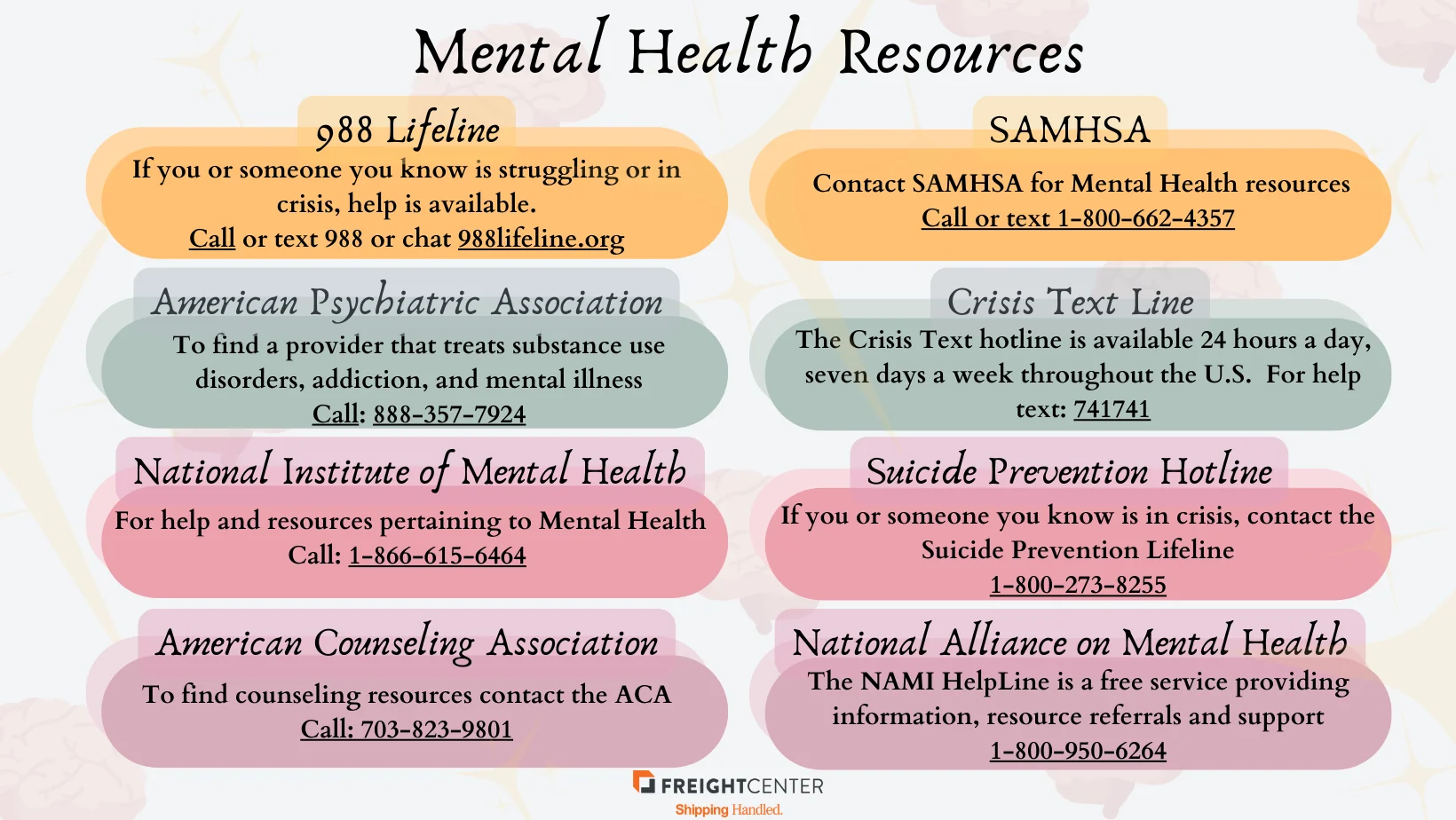The logistics industry, the backbone of global commerce, plays a pivotal role in facilitating the worldwide movement of goods and services. However, amid the fast-paced logistics sector, where efficiency and productivity are paramount, the mental health of its workforce often takes a backseat. In this article, we will explore the intricate dynamics of mental health in the logistics industry, its underlying causes, and potential solutions, all while emphasizing the critical role of mental health education.
Mental Health in Logistics: A High-Stress Environment
The logistics industry operates in a relentless, high-pressure environment, where mental health and work-life balance are frequently overlooked. Professionals in this field constantly confront tight deadlines, long working hours, and the perpetual need to adapt to unforeseen challenges. These demanding conditions create an ideal breeding ground for mental health issues.
High Stress Levels: In the relentless pursuit of efficiency, the logistics industry places tremendous pressure on employees to meet stringent schedules, ensuring the seamless movement of goods. This constant pressure can give rise to anxiety, depression, and burnout.
Isolation: A significant proportion of logistics professionals find themselves working in remote or solitary settings, often leading to feelings of isolation and loneliness. These emotional struggles are directly associated with an elevated risk of mental health disorders.
Irregular Hours: Irregular working hours, including night shifts, disrupt circadian rhythms, giving rise to sleep disorders that further exacerbate existing mental health issues.
Physical Demands: The physically demanding nature of logistics tasks, such as loading and unloading heavy cargo, can result in physical exhaustion, which compounds the impact on mental health.
Causes of Mental Health Challenges
Several factors contribute to the mental health challenges faced by individuals working in the logistics industry:
Lack of Awareness: Within the logistics sector, mental health concerns often fly under the radar due to a pervasive lack of awareness and the stubborn stigma that surrounds these issues. To truly address mental health in logistics, it’s essential to break down these barriers and foster open dialogues, supported by mental health education.
Work-Life Imbalance: The relentless nature of logistics often results in a poor work-life balance, leaving scant time for self-care and relaxation.
Job Insecurity: The ever-evolving logistics industry, marked by the advent of automation and economic fluctuations, frequently leads to job insecurity, which, in turn, escalates stress levels among workers.
Limited Access to Mental Health Services: In many instances, logistics professionals lack easy access to mental health services, leaving them without the essential support they need to confront their mental health challenges.
The Weight of Stigma
Mental Health stigma refers to the negative beliefs, attitudes, and stereotypes that people hold towards those who experience mental health challenges. It casts a long, dark shadow over individuals, making it difficult for them to seek help or openly discuss their struggles.
Rooted in Misconceptions: Stigma often originates from misconceptions about mental health conditions. Myths and stereotypes perpetuate the belief that individuals with mental health challenges are weak, dangerous, or somehow responsible for their conditions.
Silencing Voices: The fear of being stigmatized can lead individuals to suffer in silence, refusing to seek help or share their experiences with loved ones. This silence can exacerbate mental health conditions, making recovery more challenging.
Barriers to Treatment: Stigma creates significant barriers to accessing mental health care. People may delay seeking help due to the fear of judgment, discrimination, or the belief that they can handle their issues on their own.
Impacts on Society: The stigma surrounding mental health not only harms individuals but also has broader societal implications. It contributes to discrimination, lack of funding for mental health services, and a general lack of understanding about mental health conditions.
Breaking Down the Stigma & Work Life Balance
Breaking the stigma surrounding mental health is not only a moral imperative but a critical step toward improving the well-being of individuals and society as a whole.
1. Open Conversations: Encouraging open conversations about mental health can create a safe space for individuals to share their experiences. Personal stories and open dialogues can humanize mental health challenges and challenge stereotypes.
2. Challenging Language: Language matters. Avoiding derogatory terms or jokes about mental health and choosing words that are respectful and empathetic can go a long way in reducing stigma.
3. Empathy and Compassion: Showing empathy and compassion towards individuals with mental health challenges is essential. A supportive, non-judgmental approach can help individuals feel understood and accepted.
4. Media Representation: The media plays a significant role in shaping public perceptions. Advocating for responsible and accurate portrayals of mental health in media can help combat stigma.
5. Accessible Treatment: Making mental health care more accessible and affordable reduces the barriers that stigma creates. When individuals can readily access treatment without fear of discrimination, they are more likely to seek help.
6. Advocacy and Policy Change: Advocacy efforts can drive policy change and increased funding for mental health services. These changes can reduce the disparities in access to care and promote a more inclusive society.
Mental Health Education and Training:
- Awareness Programs: Employers should initiate awareness programs to educate employees about the importance of mental health. These programs can include workshops, seminars, and informative materials on recognizing signs of mental health issues and seeking help, facilitated by mental health education.
- Mental Health First Aid Training: Providing training in mental health first aid equips employees with the skills to provide initial support to colleagues experiencing mental health challenges. This fosters a workplace culture that values mental health and mental health education.
Flexible Working Arrangements:
- Flexible Hours: Offering flexible working hours and shift patterns allows logistics professionals to better manage their work-life balance, ultimately reducing the stress associated with rigid schedules and supporting mental health education.
- Remote Work Options: In some cases, exploring remote work options can further support the quest for work-life balance, enabling employees to balance their professional and personal commitments more effectively, while still emphasizing mental health education.
Access to Support Services:
- Employee Assistance Programs (EAPs): EAPs offering confidential counseling services are invaluable in supporting mental health in logistics. Providing access to EAPs as part of the benefits package underscores the commitment to employee well-being, mental health, and mental health education.
- On-Site Mental Health Services: Innovative companies are now offering on-site mental health services, such as counseling or therapy sessions, making it more convenient for employees to seek help while promoting work-life balance and mental health education.
Physical Well-Being:
- Ergonomic Training: Investing in ergonomic training to minimize physical strain and reduce the risk of stress-related injuries is essential for both physical and mental health, further highlighting the importance of mental health education.
- Wellness Programs: Wellness programs that encompass fitness, nutrition, and stress management initiatives are instrumental in fostering a culture that values work-life balance, employee well-being, and mental health education.
Peer Support Networks:
- Employee Resource Groups (ERGs): Establishing ERGs dedicated to mental health creates a sense of community, provides peer support, and organizes events and activities that underscore the importance of maintaining a healthy work-life balance through mental health education.
- Mentoring and Buddy Systems: Mentorship and buddy systems within the workplace ensure that employees have someone to turn to for guidance and emotional support, reinforcing the significance of work-life balance and mental health education.
Regular Mental Health Check-Ins:
- Supervisor Training: Training supervisors to recognize signs of mental health distress and encouraging open conversations during regular check-ins are vital for promoting both mental health and work-life balance, with a strong foundation in mental health education.
- Anonymous Reporting Systems: Implementing anonymous reporting systems for mental health concerns provides a safe avenue for employees to voice their challenges, highlighting the importance of supporting both mental health and work-life balance, fortified by mental health education.
Stress-Reduction Initiatives:
- Stress-Reduction Programs: Offering stress-reduction programs, such as mindfulness meditation and stress management workshops, equips employees with effective coping strategies and underscores the importance of work-life balance, further reinforced by mental health education.
- Workspace Design: Creating a supportive workspace that minimizes stressors, incorporates natural elements, and promotes mental well-being is an integral aspect of fostering a workplace culture that values work-life balance and mental health education.
In conclusion, addressing mental health in the logistics industry while concurrently emphasizing the significance of work-life balance necessitates a holistic, multi-pronged approach. By integrating these strategies into the fabric of the logistics industry, employers can create an environment where mental health is valued, supported, and prioritized alongside achieving a healthy work-life balance, all underpinned by robust mental health education. Ultimately, this approach benefits not only the mental health of workers but also enhances the industry’s overall productivity and sustainability, marking a pivotal step toward a healthier future for logistics professionals.



